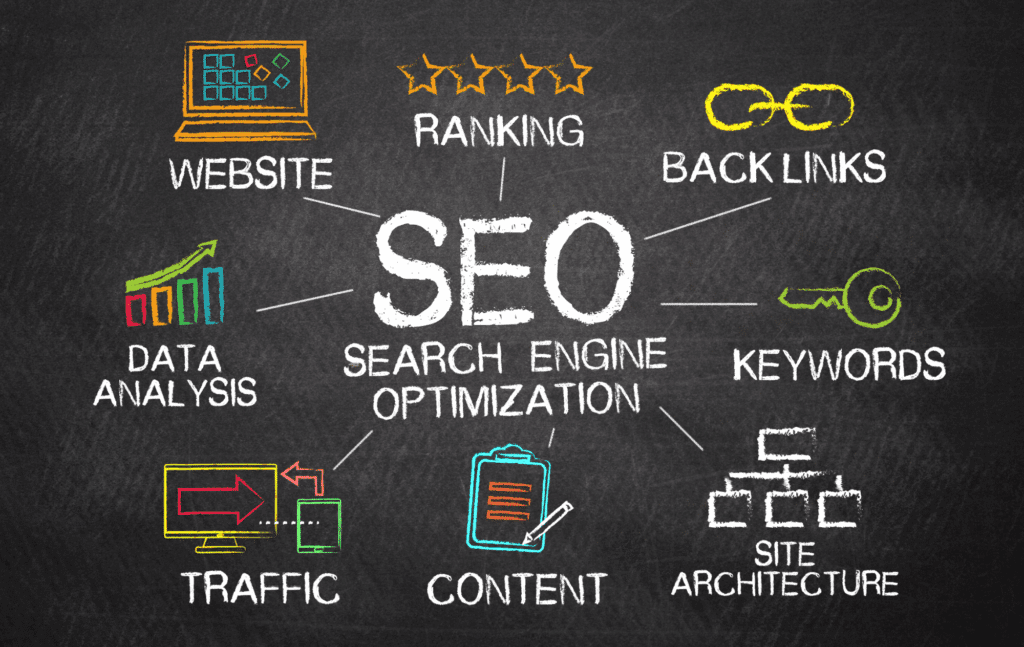Why do you need a Business Website?

In today’s digital age, a professional business website is not just a nice-to-have but a must-have. Your website is often the first interaction potential customers have with your business, and as the saying goes, you never get a second chance to make a first impression. Let’s dive into why having a professional business website is crucial for your business’s legitimacy, trustworthiness, and overall success.
1. Legitimacy and Trustworthiness
Establishing a Digital Identity
Your website is the digital face of your business. It’s where potential customers go to learn about who you are, what you offer, and why they should choose you over competitors. A well-designed website with a professional look and feel signals that you are serious about your business. A professional business website signals legitimacy and trustworthiness. It provides a platform to showcase products, services, and customer testimonials, which can help build trust with potential customers. Conversely, businesses without a website may be perceived as less credible or outdated.
Professional Design and User Experience
The design of your website can significantly influence how your business is perceived. A clean, modern design with intuitive navigation makes a positive impression, while a cluttered or outdated design can drive potential customers away. Investing in good web design is investing in your brand’s reputation. A well-designed website with intuitive navigation, engaging content, and responsive design enhances user experience. This encourages visitors to stay longer, explore more, and potentially convert into customers. On the other hand, a poorly designed website can deter visitors and negatively impact a business’s reputation.

2. Round-the-Clock Availability
A business website ensures 24/7 availability, enabling customers to access information, ask questions, and make purchases anytime, from any location. Unlike physical stores with set hours, a website offers constant access, catering to the needs of today’s fast-paced, always-connected society.
Global Reach
A business website breaks down geographical barriers, allowing a business to reach customers worldwide. This expansion increases market potential and revenue opportunities, crucial for businesses looking to grow and enter international markets.
Customer Support and Engagement
Features like live chat, FAQs, and contact forms on a business website provide instant customer support and interaction. These tools boost customer satisfaction and loyalty. Additionally, websites offer a platform for collecting feedback and insights, which can be used to shape future strategies and improvements.
3. Enhancing Marketing and Visibility
A business website is a powerful marketing tool that greatly boosts a company’s visibility and reach. It serves as a central hub for all online marketing activities, including search engine optimization (SEO), social media marketing, content marketing, and email marketing.
Search Engine Optimization (SEO)
SEO involves optimizing a website to rank higher in search engine results pages (SERPs). A well-optimized business website can attract organic traffic, increasing visibility and drawing potential customers. SEO encompasses various strategies, including keyword research, content creation, and link building, all contributing to better search engine rankings.
Content Marketing
A business website serves as a platform for content marketing, which involves creating and sharing valuable content to attract and engage an audience. Blog posts, articles, videos, and infographics can help establish a business as an authority in its industry, driving traffic and generating leads.
Social Media Integration
Business websites can integrate with social media platforms, enabling businesses to share content and engage with their audience across multiple channels. This integration can increase visibility, drive traffic to the website, and enhance brand awareness.
Email Marketing
Business websites can capture email addresses through sign-up forms and lead magnets, allowing businesses to build a mailing list. Email marketing is a highly effective way to nurture leads, promote products or services, and maintain ongoing communication with customers.

4. Affordable Marketing Solution
A business website is a cost-effective alternative to traditional advertising and marketing methods. The initial investment in creating a website is quickly outweighed by the long-term benefits and returns it delivers.
Lower Advertising Costs
A business website allows businesses to leverage digital marketing strategies, which are often more affordable and measurable than traditional advertising methods. Pay-per-click (PPC) advertising, social media ads, and email campaigns can target specific audiences and provide detailed analytics, ensuring a better return on investment (ROI).
Automated Processes
Business websites can automate various business processes, such as appointment scheduling, order processing, and customer support. This reduces operational costs and frees up resources to focus on other areas of the business.
5. Marketing and Visibility
A Hub for Online Marketing Efforts
A business website serves as a powerful marketing tool that enhances your visibility and reach. It acts as a central hub for all your online marketing efforts, including search engine optimization (SEO), social media marketing, content marketing, and email marketing.
SEO and Organic Traffic
Implementing SEO strategies on your website helps improve its ranking on search engines, making it easier for potential customers to find you. High-quality content, keyword optimization, and backlinking are key components of effective SEO.
Social Media Integration
Your website can seamlessly integrate with your social media profiles, allowing you to share content across platforms and drive traffic back to your site. Social media buttons and embedded feeds enhance user engagement and connectivity.
Content Marketing
Publishing regular blog posts, articles, and updates on your website keeps your audience informed and engaged. High-quality content not only attracts visitors but also establishes your authority

6. Customer Insights and Analytics
Business websites provide valuable insights into customer behavior and preferences through analytics tools. These insights can guide business strategies, enhance marketing efforts, and inform product development.
Analytics tools such as Google Analytics can track various metrics, including visitor demographics, behavior, and conversion rates. This data provides a deeper understanding of customer preferences and pain points, allowing businesses to tailor their offerings accordingly.
Measuring Marketing Effectiveness
Business websites allow businesses to measure the effectiveness of their marketing campaigns in real-time. By analyzing metrics such as traffic sources, bounce rates, and conversion rates, businesses can evaluate what works and what doesn’t, enabling data-driven decisions to optimize their strategies.
7. Expanding E-Commerce Potential
For businesses that sell products, a business website can function as an online store, unlocking e-commerce opportunities. E-commerce allows businesses to reach a broader audience and generate sales 24/7.
Convenient Shopping Platform
For businesses that sell products, a business website can serve as an online store, opening up e-commerce opportunities. This allows businesses to reach a wider audience and make sales around the clock.
Inventory Management
E-commerce websites can connect with inventory management systems, ensuring precise stock levels and efficient order processing. This minimizes the risk of overstocking or running out of stock, thereby enhancing operational efficiency.
Personalized Shopping Experience
Business websites can provide personalized shopping experiences through features like product recommendations and targeted promotions. This personalization boosts customer satisfaction and encourages repeat purchases.
8. Building and Managing Your Brand
A business website is a powerful tool for building and managing a brand’s reputation. It provides a platform to communicate a business’s values, mission, and vision, and to engage with customers on a deeper level.
Unified Brand Presence
A business website allows businesses to maintain consistent branding across all online platforms. Using the same logos, colors, and messaging reinforces brand identity and fosters brand recognition.
Leveraging Customer Feedback
Business websites can feature customer reviews and testimonials, which build social proof and trust. Positive reviews can influence potential customers’ purchasing decisions, while businesses can address negative feedback constructively.
Effective Crisis Communication
In times of crisis, a business website serves as an official communication channel. Businesses can use their website to provide updates, address concerns, and proactively manage their reputation.

9. Flexibility and Growth Potential
Business websites offer flexibility and scalability, allowing businesses to adapt to evolving market conditions and customer demands. Unlike physical stores, websites can be easily updated and expanded.
Businesses can quickly update their website content, including product descriptions, pricing, and promotions. This ensures that customers always have access to the most current information.
Scalable Growth Solutions
As a business grows, its website can scale to accommodate increased traffic and additional features. Cloud hosting solutions and Content Management Systems (CMS) provide the necessary infrastructure to support this scalability.
Regulatory Compliance and Transparency
Having a business website can help businesses meet legal and regulatory requirements. It offers a platform to display essential information, such as terms and conditions, privacy policies, and disclaimers.
Transparency and Compliance
Business websites allow businesses to be transparent about their practices and policies. This transparency enhances trust and ensures compliance with regulations like the General Data Protection Regulation (GDPR).
Documenting Transactions
For e-commerce businesses, a website provides a record of transactions, useful for accounting, auditing, and resolving disputes. This documentation ensures accountability and legal compliance.
Conclusion: The Essential Role of a Business Website
In conclusion, a business website is an essential asset for any company. It acts as a digital storefront, a marketing platform, a customer engagement tool, and more. The benefits of having a website are extensive, from establishing credibility and trust to expanding reach and improving customer experience. In today’s world, where digital presence is crucial, businesses without a website risk falling behind their competitors. Therefore, investing in a professional website is not just a strategic decision; it is a critical step towards achieving long-term success and growth.